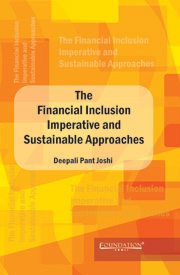Book contents
- Frontmatter
- Contents
- Foreword
- Acknowledgment
- 1 An Overview on Development
- 2 Financial Inclusion: The Nature and Extent of the Challenge
- 3 Financial Inclusion: The Indian Perspective
- 4 Tackling Financial Inclusion and RBI Policy: Responses and Voluntary Initiatives of Banks
- 5 Microfinance Experience and Other Institutional Approaches
- 6 Policy Response Committee on Financial Inclusion
- 7 International Experience in Promoting Financial Inclusion and Policy Responses
- 8 The Way Forward – Determinants and Macro Policies
- Appendix
- Bibliography
- Index
2 - Financial Inclusion: The Nature and Extent of the Challenge
Published online by Cambridge University Press: 05 June 2012
- Frontmatter
- Contents
- Foreword
- Acknowledgment
- 1 An Overview on Development
- 2 Financial Inclusion: The Nature and Extent of the Challenge
- 3 Financial Inclusion: The Indian Perspective
- 4 Tackling Financial Inclusion and RBI Policy: Responses and Voluntary Initiatives of Banks
- 5 Microfinance Experience and Other Institutional Approaches
- 6 Policy Response Committee on Financial Inclusion
- 7 International Experience in Promoting Financial Inclusion and Policy Responses
- 8 The Way Forward – Determinants and Macro Policies
- Appendix
- Bibliography
- Index
Summary
Financial inclusion is one of the biggest challenges in the world of economics. It is enabling the delivery of banking services at an affordable cost to the vast sections of disadvantaged and low income groups. Unrestrained access to public goods and services is the sin qua non of an open and efficient society. Banking services are essentially for welfare of the public. It is imperative that the availability of banking and payment services to the entire populace without discrimination should be the prime objective of public policy. Thus, banking is perceived as a public good. Financial inclusion has positive externalities: it leads to increase in savings, investment and thereby spurs the processes of economic growth. When 69 per cent of the people are beyond the pale of the formal financial system, their savings remain untapped and their credit needs remain unfulfilled. In the specific Indian context, financial savings of the household sector have been declining from 48.2 per cent in 2000–01 to 46.7 per cent in 2004–05 commensurably. There has been an increase in physical savings from 51.2 per cent to 53.3 per cent during the same period. One plausible reason could be the lack of banking/financial services which would encourage savings in many places. The extent of bank branch expansion reflects the extent of availability of financial services through mainstream providers. Interestingly, there has been a decline in the number of rural branches of banks; as per available data, there were 32,562 branches in rural areas during 2001, i.e. 49.4 per cent.
- Type
- Chapter
- Information
- Publisher: Foundation BooksPrint publication year: 2011



